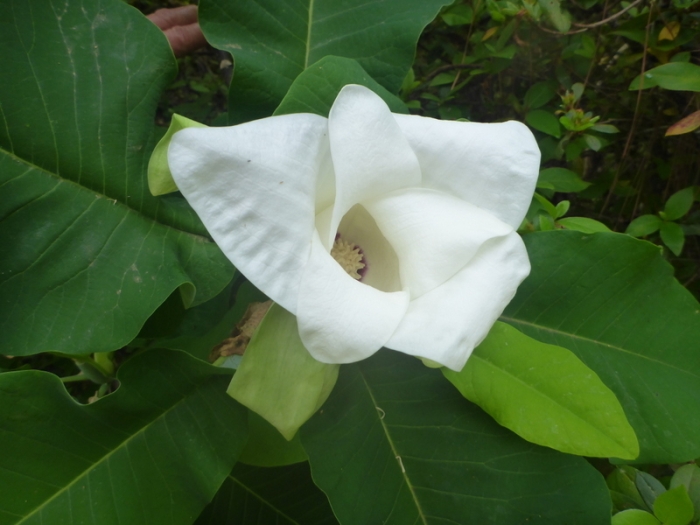Fraser Magnolia
(Magnolia fraseri)
Fraser Magnolia (Magnolia fraseri)
/
/

© mfeaver
CC BY 4.0
Image By:
© mfeaver
Recorded By:
Copyright:
CC BY 4.0
Copyright Notice:
Photo by: © mfeaver | License Type: CC BY 4.0 | License URL: http://creativecommons.org/licenses/by/4.0/ | Uploader: mfeaver | Publisher: iNaturalist |

















Estimated Native Range
Summary
Magnolia fraseri, commonly known as Fraser Magnolia, is a deciduous tree native to the rich, moist, acidic soils of the understory in mixed hardwood forests, particularly in the southern Appalachian Mountains and adjacent Atlantic and Gulf Coastal Plain from West Virginia to northern Florida and eastern Texas. It typically grows up to 40 feet tall with a similar spread, featuring large, broad leaves that are 6-10 inches long and have distinctive earlobe-like bases. The tree is noted for its large, showy white flowers, which are 6-10 inches in diameter with a pleasant fragrance, blooming in late spring to early summer. The flowers are followed by rose-colored fruit that attracts birds and other wildlife.
Fraser Magnolia is valued for its ornamental qualities, including its large, fragrant flowers and bold foliage. It is often used in woodland gardens, as a specimen tree, or in naturalized areas. While it prefers rich, moist, well-drained acidic soil, it can adapt to drier sites once established. It requires part shade to full sun and benefits from protection from strong winds. This species is less commonly used than other magnolias but offers a native alternative to exotic species. It is relatively low maintenance but can be susceptible to leaf spot and canker diseases. It is not known for aggressive roots or significant invasiveness issues.CC BY-SA 4.0
Fraser Magnolia is valued for its ornamental qualities, including its large, fragrant flowers and bold foliage. It is often used in woodland gardens, as a specimen tree, or in naturalized areas. While it prefers rich, moist, well-drained acidic soil, it can adapt to drier sites once established. It requires part shade to full sun and benefits from protection from strong winds. This species is less commonly used than other magnolias but offers a native alternative to exotic species. It is relatively low maintenance but can be susceptible to leaf spot and canker diseases. It is not known for aggressive roots or significant invasiveness issues.CC BY-SA 4.0
Plant Description
- Plant Type: Tree
- Height: 25-50 feet
- Width: 20-30 feet
- Growth Rate: Rapid
- Flower Color: White
- Flowering Season: Spring
- Leaf Retention: Deciduous
Growth Requirements
- Sun: Full Sun, Part Shade
- Water: Medium
- Drainage: Fast, Medium
Common Uses
Bee Garden, Bird Garden, Border Plant, Butterfly Garden, Fragrant, Low Maintenance, Potted Plant, Showy Flowers
Natural Habitat
Native to the understory in mixed hardwood forests
Other Names
Common Names: Fraser Magnolia, Earleaf Magnolia, Ear-Leaf Umbrella-Tree, Mountain Magnolia, Umbrella Magnolia
Scientific Names: , Magnolia fraseri, Magnolia auriculata, Magnolia cordata, Magnolia pyramidata, Paramagnolia fraseri,
GBIF Accepted Name: